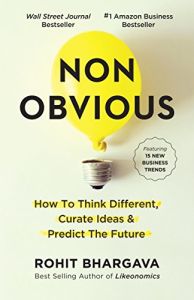Зарегистрируйтесь на getAbstract, чтобы получить доступ к этому краткому изложению.

Зарегистрируйтесь на getAbstract, чтобы получить доступ к этому краткому изложению.
Rohit Bhargava
Non-Obvious
How to Think Different, Curate Ideas & Predict The Future
Ideapress, 2015
Что внутри?
Forecast trends to keep your business at the forefront of change.
Recommendation
After years of accurately forecasting trends in his annual Non-Obvious Trend Report, best-selling Likeonomics author Rohit Bhargava now reveals his practical methodology. He describes himself as the curator of thousands of bits of information that reflect the changing present. He looks for subtle but broad connections among many apparently disparate industries, behaviors and ideas. Then, he uses long-term analysis to find patterns that signal newly forming trends and to develop insights about applying them. His “non-obvious” thought curation process leads him to a deeper understanding of people as interactive consumers and can enable you to anticipate near-future changes in behavior patterns and to use that information to improve your business. Bhargava illuminates his analysis of 15 top trends and tips on applying them with a step-by-step explanation of his forecasting process. getAbstract recommends this distinctive take on trend prediction to intrepid entrepreneurs and curious consumers.
Summary
About the Author
Georgetown University professor Rohit Bhargava predicts trends in his Non-Obvious Trend Report. He founded the Influential Marketing Group and wrote the bestseller Likeonomics.

















Comment on this summary